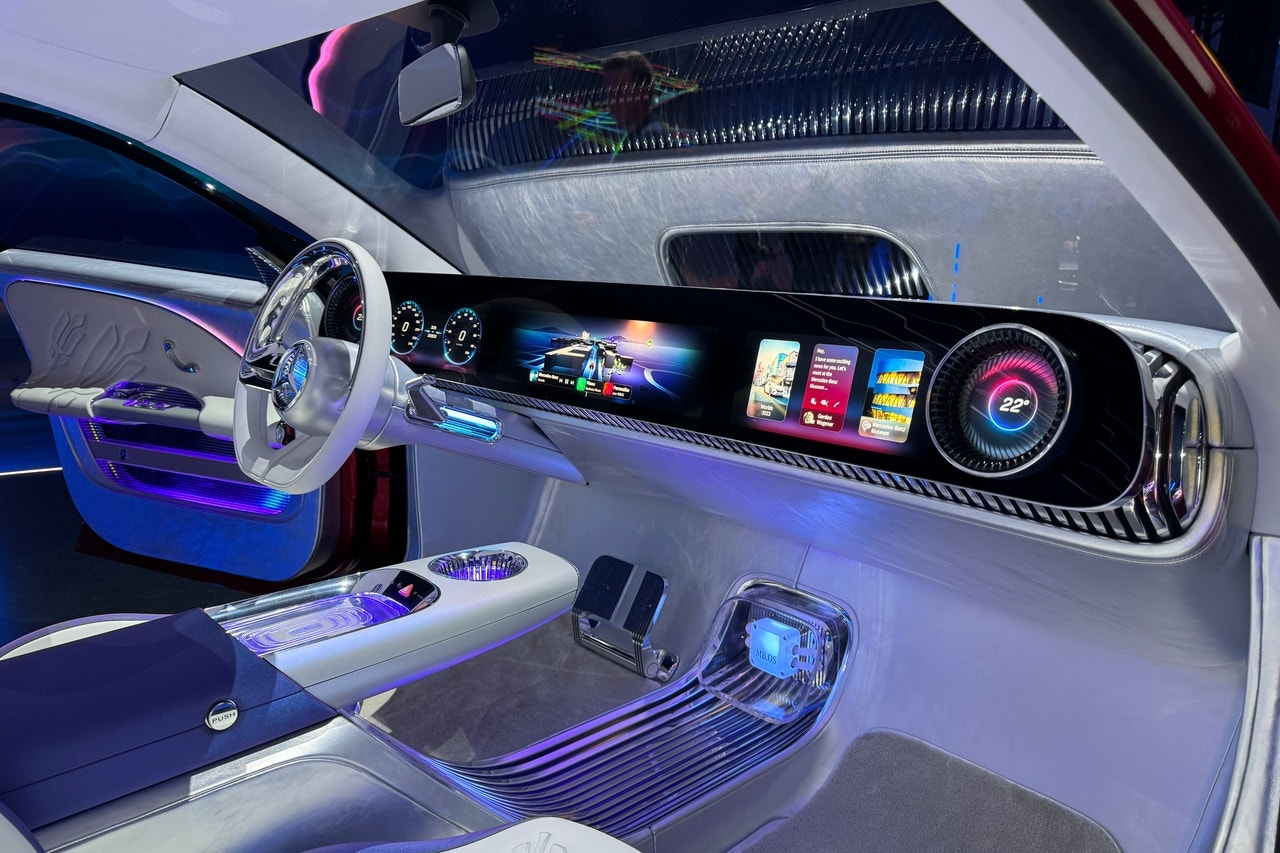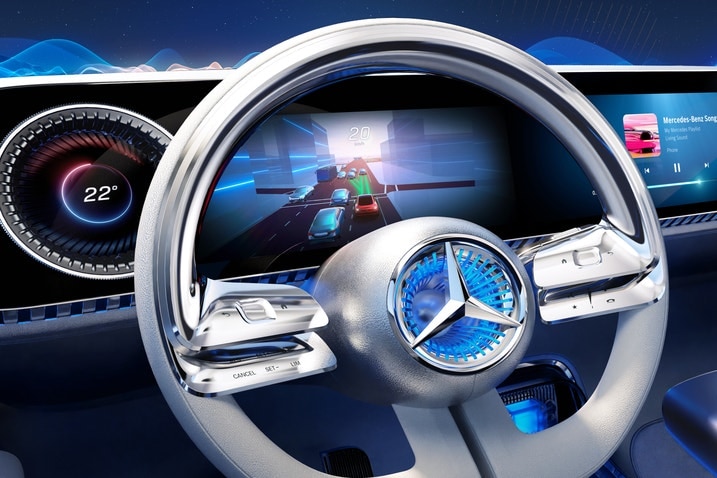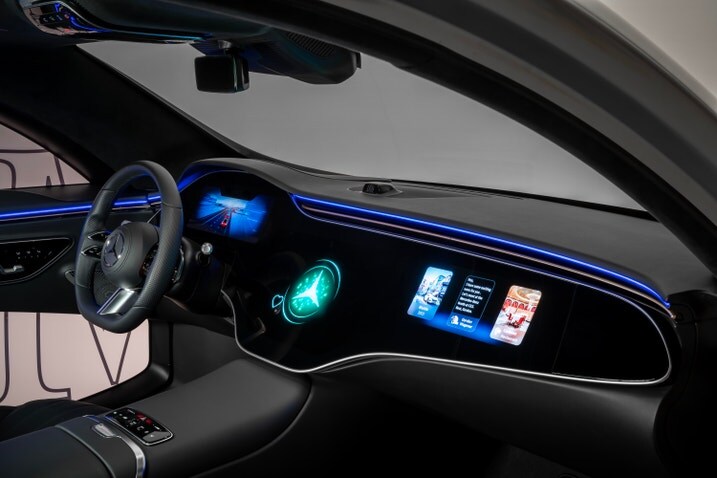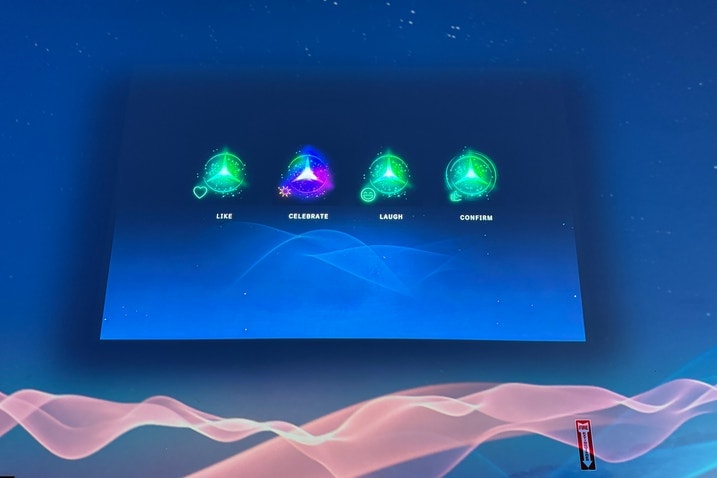- Mercedes-Benz showed off a range of new in-car tech at CES, including its next-generation virtual assistant, powered by artificial intelligence.
- The new assistant will be more conversational, and respond with human-like qualities and emotion — for better or worse.
- These features will be available starting with the new CLA as early as next year.
Mercedes Wants Your Next Car to Be Your Friend
A new AI-powered virtual assistant has the potential to change how we interact with our cars forever
Automakers love to outline their “visions for the future” at CES (formerly known as the Consumer Electronics Show). Year after year, the annual Las Vegas event is full of bold and often overblown predictions for what cars will be like near and far. And as you might predict, everyone’s favorite buzzphrase — artificial intelligence — propelled the conversation this year, forcing us to ponder just how capable we want our cars to be.
Mercedes-Benz is ready to prominently feature AI in its vehicles and reimagine the way you interact with your car. Its new virtual assistant is being developed to be less a like helper and more like a friend that you chat with on a regular basis. I sat down with the company’s chief technology officer and chief software engineer to learn more and figure out what this all means for customers in the coming years.
A big upgrade for hardware and software
Mercedes is no stranger to pushing the envelope with technology. Its expansive range of vehicles already has some of the most advanced features in the world, including the Level 3 Drive Pilot system (imminently available for the 2024 S-Class and EQS sedans) and the massive Hyperscreen infotainment display.
But things are about to change drastically with the introduction of MB.OS, a new operating system developed in-house. With help from the Unity video game engine and a host of other new hardware, the new Mercedes infotainment system will be much more powerful and capable. There will be advanced in-car gaming, 3D “Surround Navigation” and a long list of things to come. All of this will be available starting with the new CLA and the introduction of the Mercedes Modular Architecture (MMA) platform sometime next year.
A turning point for in-car technology
Anyone who has experimented with last year’s viral sensation ChatGPT knows that large language models have drastically changed the way we convey information. Mercedes got in on the fun, deploying the feature in 900,000 of its vehicles in mid-2023. Other automakers, like Volkswagen, are poised to do the same.
Turns out, Mercedes owners liked the ChatGPT-powered voice assistant — or at least used it far more often than the Mercedes-developed assistant. According to Mercedes CTO Markus Schäfer, drivers who had the ChatGPT functionality in their cars used the assistant 30% to 40% more than those who didn’t. Or as he put it, “drastically more than we expected.” This was enough to greenlight a broader plan for AI, with one major change: The company is stepping away from ChatGPT in favor of a yet-to-be-named partner or partners. Considering Google's increased integration with Mercedes' systems, it wouldn’t be a surprise to see the tech giant fulfill the role.
Regardless of who's developing it, the virtual assistant promises to drastically change how we interact with our cars. We’re talking about a shift from “Hey Mercedes, turn on my heated seat” to “Hey Mercedes, help me assemble a detailed presentation that I need to give once I arrive at work today.” Schäfer believes the majority of queries from passengers to the assistant will be productivity-based.
With AI’s unprecedented ability to learn, and learn quickly, your car’s assistant will become better by the day. What’s strange is that this is contingent on permissions and data sharing. If you and I buy an identical Mercedes car and you choose to give it more access to your calendar and personal information, your car’s assistant will be smarter than mine. That said, it's still too early to tell just how much this technology can evolve, so speculating on the assistant’s full potential seems futile. Frankly, there’s a bigger question on my mind and probably yours, too: Do people want all of this?
Your new best friend
Magnus Östberg, Merc's chief software engineer, is tasked with moving this technology into people’s lives and selling it as a benefit. But even he admits that the use case will be different for every customer.
“In China, for example, our data shows that customers had a great need just to talk to their virtual assistants regularly — like you would a friend. In Germany, it will likely be used less often.” Östberg then said that the American market would be a mixed bag, depending on region, with some customers likely using their assistants more than others.
Mercedes has described this new assistant as humanlike, even having the ability to simulate empathizing with the driver's mood. If you’re having an awesome day and your voice sounds upbeat, then expect your Mercedes to meet you with the same energy. If you’re down in the dumps, then your car will dial things back and strike a more somber tone. The goal is to have more frequent and longer conversations with your car’s assistant.
“It’s now a two-way conversation with the product, and that changes the relationship. You can have meaningful dialogue, and interact far more frequently,” Schaffer said. I asked if that changes the relationship from an assistant to more of a friendship, to which he shrugged and said, “In a way, yes.”
Edmunds says
This might be a bridge too far for some customers, and Mercedes knows that. While the company's internal data shows promise for widespread adoption, the new assistant is more about putting an advanced new feature in front of their drivers who can afford to pay for it.
We’ve seen new and exciting features fail to captivate customers in the past. But if this AI integration catches a spark and stays around, our relationship with the cars we drive could shift into a world with unlimited possibilities.








 by
by